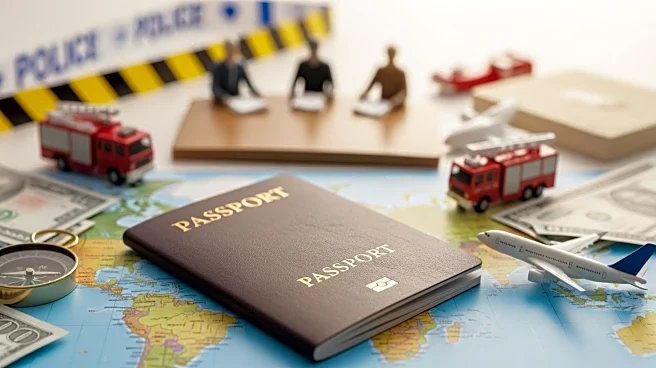What's Happening?
The Henley Passport Index, utilizing data from the International Air Transport Association, has revealed a decline in the power of the US passport. Once a leader in global mobility, the US passport now grants visa-free access to 180 destinations, a drop
from its previous seventh place ranking. This decline is attributed to policy changes by other countries, such as Brazil revoking visa-free entry for Americans due to perceived imbalances in reciprocal access. China, meanwhile, has expanded its visa-free options, improving its global mobility ranking. The US now ranks 77th on the Henley Openness Index, highlighting a disparity between the number of countries US citizens can access visa-free and the limited number of nationalities granted similar access to the US.
Why It's Important?
The weakening of the US passport reflects broader geopolitical shifts and changes in global mobility dynamics. Countries embracing openness and cooperation, like China, are enhancing their influence, while the US faces challenges due to isolationist policies. This decline in passport power may impact American citizens' ability to travel freely and could influence international relations and trade. The trend also suggests a growing interest among Americans in obtaining alternative citizenships to mitigate jurisdictional risks and enhance personal and financial prospects. As global alliances shift, the US passport's diminished power serves as a reminder of the importance of strategic international engagement.
What's Next?
The decline in US passport power may prompt further policy discussions and potential diplomatic efforts to address reciprocal access issues. As Americans increasingly seek alternative citizenships, investment migration programs may see a rise in participation. This trend could lead to changes in how citizenship and residency are perceived and pursued by US citizens. Additionally, the evolving global mobility landscape may influence future US foreign policy and trade negotiations, as the country navigates its position in an increasingly multipolar world.
Beyond the Headlines
The shift in passport power highlights ethical and cultural dimensions, as it reflects changing perceptions of national identity and global citizenship. The trend towards obtaining multiple citizenships may alter traditional notions of allegiance and belonging, influencing cultural and societal norms. This development also raises questions about the long-term implications for national security and immigration policies, as countries balance openness with protective measures.
















